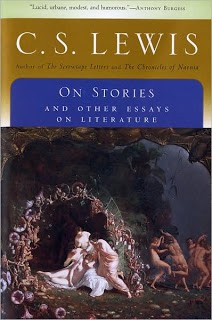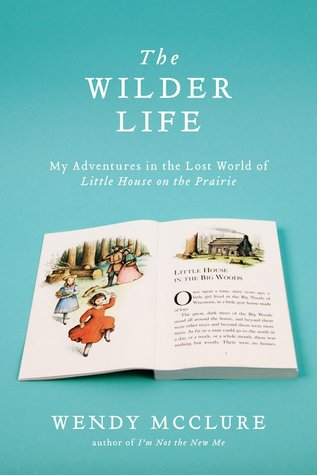On Stories and Other Essays on Literature
 For those interested in a thought-provoking journey into a writer’s mind, this collection of C.S. Lewis’s literary essays contains some gems. Aside from the title essay, which I wrote about a few weeks ago, it contains Lewis’s insights into the process by which some of his stories came to be, critical perspectives on some of his contemporaries (Tolkien, Sayers, Williams, Orwell…), and forays into literary questions such as what it takes to write for children, fairy tales, science fiction, and standards for good literary criticism. A few of the essays were published during his lifetime, but the majority of these were not. Though I wasn’t equally interested in all of these topics, I loved seeing Lewis’s interactions with contemporaries and friends, and his observations about literary study from an author’s perspective. I appreciate Lewis’s democratic literary tastes; though a lover of the classics, he read widely in more popular fare and was unstinting in his praise when he felt it was deserved.
For those interested in a thought-provoking journey into a writer’s mind, this collection of C.S. Lewis’s literary essays contains some gems. Aside from the title essay, which I wrote about a few weeks ago, it contains Lewis’s insights into the process by which some of his stories came to be, critical perspectives on some of his contemporaries (Tolkien, Sayers, Williams, Orwell…), and forays into literary questions such as what it takes to write for children, fairy tales, science fiction, and standards for good literary criticism. A few of the essays were published during his lifetime, but the majority of these were not. Though I wasn’t equally interested in all of these topics, I loved seeing Lewis’s interactions with contemporaries and friends, and his observations about literary study from an author’s perspective. I appreciate Lewis’s democratic literary tastes; though a lover of the classics, he read widely in more popular fare and was unstinting in his praise when he felt it was deserved.
“On Criticism,” toward the end of the book, is worth reading by anyone with an interest in writing about books. He points out a number of weaknesses and blind spots common to reviewers and sets a high standard for doing justice to a work of literature. I found it interesting to recognize some common assumptions we may wrongly make about a given book when we respond to it — authorial motives, authorial writing processes, and even aspects of a book’s publication.
Of course the most common sense recommendation Lewis makes is to read carefully. “Unless you have been often reviewed you will hardly believe how few reviewers have really done their Prep,” he complains. I felt a flash of guilt over the fragmented nature of my own reading life in these busy days; I’m certain I don’t read as carefully and as deeply as I’ve been able to in other seasons of life. Yet I always feel compelled to write about what I’ve read. I find myself thinking about ways to write about books without pronouncing judgment. In the past I’ve considered the term “book engagement” rather than “review,” and I think I still prefer that term. I love having this blog as a record of my reading life, and I do often return to “reviews” to refresh my memory of books I’ve read. But it’s rare that I close a book and feel truly finished with it. Usually, if I liked it at all, I close it with a mental note to return to it at a future date. Any judgment of its quality can only be preliminary.
Lewis is a kindred spirit in this sense. “A book’s no good to me till I’ve read it two or three times,” he explains in “Unreal Estates.” And in “On Stories” he develops the idea further:
An unliterary man may be defined as one who reads books once only. There is hope for a man who has never read Malory or Boswell or Tristram Shandy or Shakespeare’s Sonnets: but what can you do with a man who says he ‘has read’ them, meaning he has read them once, and that settles the matter?… We do not enjoy a story fully at the first reading. Not till the curiosity, the sheer narrative lust, has been given its sop and laid asleep, are we at leisure to savor the real beauties.
It’s interesting to think about the effect blogging has had on my rereading. For the first few years I aimed for quantity, I’m ashamed to admit: I tried to read a book a week and write a “review.” Over the last year or two, as the novelty of blogging has worn off, my pace has slowed considerably and I’ve done more rereading. Thinking about this as I read Lewis’s essays, I felt a little relieved. Maybe I’m moving in the right direction to counteract the tendency toward haste and superficiality.
Speaking of rereading, these essays made me want to return to the space trilogy. I’ve reread That Hideous Strength twice, and after learning more of Lewis’s perspective on science fiction in general I’d like to read it again. There are a number of other titles sprinkled throughout these pages that pique my interest as well. For the reader interested in Lewis’s own ideas about the larger literary context of which his books are a part, On Stories provides a welcome opportunity to see his mind at work.



4 Comments
Jeane
I think I would really like to read this, I’m particularly intrigued by his observations on the review process, probably I would learn quite a few things I ought to be doing different myself! As a side note, I have tried to read his sic if trilogy twice, and never managed to get through the hideous strength. However, I was rather young so maybe now is a better time to try it again.
Janet
I know what you mean. It’s difficult reading — I think that’s why I keep rereading it myself! It’s the only one in the trilogy that I keep going back to.
Barbara H.
I just put this on my wish list after reading your thoughts. Maybe I’ll ask for it for Christmas.
I sometimes find that a book I wasn’t too keen on at first reading will manifest some redeeming features as I go back over it to review it. It’s hard sometimes to balance rereading and new rereading – there are so many new-to-me books that look so inviting! But I do benefit from rereading. There are some books I have reread multiple times and still don’t feel I have grasped yet.
Janet
“I sometimes find that a book I wasn’t too keen on at first reading will manifest some redeeming features as I go back over it to review it.” Me too. One of the interesting things Lewis talks about is that even in books that are “bad” on some level — style or execution — we can catch a glimpse of something profound and life changing. Just another reminder that the whole business of “judging” books is pretty complex!